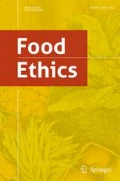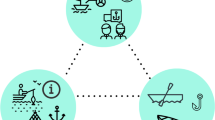Abstract
We propose the FoodSmart City framework as a transdisciplinary avenue to promote sustainable seafood consumption. We argue that a change in human seafood consumption towards eating at lower trophic levels may be helped by discovering forgotten cultural practices and tapping into locally-sourced marine resources. We set out a framework of knowledge exchange and production between academia, businesses, and civil society to promote and assist healthy and ecologically sustainable living using digital tools and intangible cultural heritage while engaging with innovative chefs and educationalists. The framework targets Dublin City, Ireland, but may potentially be replicated in other contexts.


Similar content being viewed by others
References
Anderson, J.L., and S.U. Bettencourt 1993. A conjoint approach to model product preferences: The New England market for fresh and frozen salmon. Marine Resource Economics 8 (1): 31–49.
Ankamah-Yeboah, I., M. Nielsen, and R. Nielsen. 2016. Price premium of organic salmon in Danish retail sale. Ecological Economics 122: 54–60.
Asche, F., T.A. Larsen, M.D. Smith, G. SognGrundvåg, and J.A. Young. 2015. Pricing of ecolabels with retailer heterogeneity. Food Policy 53: 82–93.
Béné, C., M. Barange, R. Subasinghe, P. Pinstrup-Andersen, G. Merino, G.I. Hemre, and M. Williams. 2015. Feeding 9 billion by 2050-Putting fish back on the menu. Food Security 7 (2): 261–274. https://doi.org/10.1007/s12571-015-0427-z.
Bonhommeau, S., L. Dubroca, O. Le Pape, J. Barde, D.M. Kaplan, E. Chassot, and A.E. Nieblas. 2013. Eating up the world’s food web and the human trophic level. Proceedings of the National Academy of Sciences 110 (51): 20617–20620.
Bord Bia. 2019. https://www.bordbia.ie/industry/sector-profiles/facts-irish-agriculture-food-drink-sector/. Visited 12 November 2019.
Bord Iascaigh Mhara (BIM). http://www.bim.ie/ - visited 14 January 2019
Bronnmann, J., and F. Asche. 2017. Sustainable seafood from aquaculture and wild fisheries: Insights from a discrete choice experiment in Germany. Ecological Economics 142: 113–119.
Browne, S., S. Minozzi, C. Bellisario, et al. 2019. Effectiveness of interventions aimed at improving dietary behaviours among people at higher risk of or with chronic non-communicable diseases: An overview of systematic reviews. European Journal of Clinical Nutrition 73: 9–23. https://doi.org/10.1038/s41430-018-0327-3.
Chidmi, B., T. Hanson, and G. Nguyen. 2012. Substitutions between fish and seafood products at the US national retail level. Marine Resource Economics 27 (4): 359–370.
Clarkson, L.A., and E.M. Crawford. 2001. Feast and famine, food and nutrition in Ireland 1500–1900. Oxford: Oxford University Press.
Cooke, J. 2000. The rise and fall of Ringsend oyster beds, 59–61. Sandymount Community Services: A Maritime History of Ringsend. Dublin.
Cowan, C., and R. Sexton. 1997. Ireland’s traditional foods: An exploration of Irish local & typical foods and drinks. Teagasc, The National Food Centre: Dublin.
Cuan Beo. www.cuanbeo.com. Visited 14 January 2019.
Duarte, C.M., N. Marbá, and M. Holmer. 2007. Rapid domestication of marine species. Science 316 (5823): 382.
Duarte, C.M., M. Holmer, Y. Olsen, D. Soto, N. Marbà, J. Guiu, and I. Karakassis. 2009. Will the oceans help feed humanity? BioScience 59 (11): 967–976. https://doi.org/10.1525/bio.2009.59.11.8.
Enterprise Ireland. 2019. https://www.enterprise-ireland.com/en/Start-a-Business-in-Ireland/Food-Investment-from-Outside-Ireland/Key-Sectors/Meat-and-Livestock/. Visited 12 November 2019.
Food and Agriculture Organization of the United Nations. 2019. Fisheries and Aquaculture Department http://www.fao.org/fishery/statistics/global-consumption/en. Visited 4 February 2019.
Food from the Oceans. How can more food and biomass be obtained from the oceans in a way that does not deprive future generations of their benefits? High Level Group of Scientific Advisors Scientific Opinion No. 3/2017 (Informed by SAPEA Evidence Review Report No 1) Brussels, 29 November 2017.
Government of Ireland. 2019. The Rural Development Plan for Ireland 2014–2020, 2019 Information and Publicity Strategy, 1–46.
Gu, G., and J.L. Anderson. 1995. Deseasonalized state-space time series forecasting with application to the US salmon market. Marine Resource Economics 10 (2): 171–185.
Haider, J., and W. Boonstra. 2017. Finding the middle ground: Social-ecological farming as a solution to a polarized debate. Solutions 8 (1): 36–38.
High Level Panel of Eminent Persons on the Post-2015 Development Agenda. 2013. A new global partnership: Eradicate poverty and transform economies through sustainable development, the report of the high-level panel of eminent persons on the Post-2015 development agenda, 17. New York: United Nations.
Holland, D., and C.R. Wessells. 1998. Predicting consumer preferences for fresh salmon: The influence of safety inspection and production method attributes. Agricultural and Resource Economics Review 27 (1): 1–14.
Holm, P., J. Adamson, H. Huang, L. Kirdan, S. Kitch, I. McCalman, J. Ogude, M. Ronan, D. Scott, K.O. Thompson, C. Travis, and K. Wehner. 2015. Humanities for the environment – a manifesto for research and action. Humanities IV: 977–992. https://doi.org/10.3390/h4040977.
Keys, A., C. Aravanis, H. Blackburn, R. Buzina, B.S. Djordjevic, A.S. Dontas, E. Fidanza, M.J. Karvonen, N. Kimura, A. Menotti, I. Mohacek, S. Nedeljkovic, V. Puddu, S. Punsar, H.L. Taylor, and F.S.P. Van Buchem. 1980. Seven countries. A multivariate analysis of death and coronary heart disease. Cambridge: Harvard University Press.
Mac Con Iomaire, M. 2005. The history of seafood in Irish cuisine and culture, 219–233. Proceedings of the Oxford Symposium on Food and Cookery: Devon, Prospect Books.
Milan Urban Food Policy Pact. 2015. Food smart cities for development recommendations and 116 good practices. Retrieved from http://www. milanurbanfoodpolicypact.org/wp-content/uploads/2017/02/FSC4D-Recommendationand-good-practices.pdf
Murphy, J., 2018. Cuan Beo. Audit of the Environmental, Cultural, Social and Economic Heritage of the Native Oyster in Galway Bay, 1–54.
Naylor, R.L., R.J. Goldburg, J.H. Primavera, and N. Kautsky. 2000. Effect of aquaculture on world fish supplies. Nature 405 (6790): 1017.
O’Sullivan, A., and C. Breen. 2007. Maritime Ireland an archaeology of coastal communities. Gloucestershire: Tempus Publishing Ltd.
Olsen, Y. 2015. How can mariculture better help feed humanity? Frontiers in Marine Science 2: 46. https://doi.org/10.3389/fmars.2015.00046.
Pelto, G.H., and P.J. Pelto. 1983. Diet and Delocalization: Dietary Changes since 1750. The Journal of Interdisciplinary History 14 (2): 507–528. Hunger and History: The Impact of Changing Food Production and Consumption Patterns on Society, published by The MIT Press.
Puska, P., and T. Ståhl. 2010. Health in all policies—The Finnish initiative: Background, principles, and current issues. The Annual Review of Public Health 31: 315–328. https://doi.org/10.1146/annurev.publhealth.012809.103658.
Roheim, C.A., P.O. Sudhakaran, and C.A. Durham. 2012. Certification of shrimp and salmon for best aquaculture practices: Assessing consumer preferences in Rhode Island. Aquaculture Economics and Management 16 (3): 266–286.
Salladarré, F., Guillotreau, P., Perraudeau, Y., et al. (2010). The Demand for Seafood Eco-Labels in France. Journal of Agricultural & Food Industrial Organization, 8(1). https://doi.org/10.2202/1542-0485.1308.
Scientific Advice Mechanism (SAM). 2017. Independent Scientific Advice for Policy Making.
Sha, S., J.I. Santos, C.A. Roheim, and F. Asche. 2015. Media coverage of PCB contamination of farmed salmon: The response of US import demand. Aquaculture Economics and Management 19 (3): 336–352.
Singh, K., M.M. Dey, and P. Surathkal. 2014. Seasonal and spatial variations in demand for and elasticities of fish products in the United States: An analysis based on marketLevel scanner data. Canadian Journal of Agricultural Economics/Revue Canadienne d’agroeconomie 62 (3): 343–363.
Teagasc. 2019. https://www.teagasc.ie/rural-economy/rural-economy/agri-food-business/agriculture-in-ireland/. Visited 12 November 2019.
Travis, C., and P. Holm. 2017. Lessons for the Anthropocene from the recent past: Tobacco use, HIV/AIDS, and social transformation. Global and Planetary Change 156: 167–175.
Uchida, H., Y. Onozaka, T. Morita, and S. Managi. 2014. Demand for ecolabeled seafood in the Japanese market: A conjoint analysis of the impact of information and interaction with other labels. Food Policy 44: 68–76.
Xie, J. 2015. Testing advertising-induced rotation of demand curves in the EU salmon market. Aquaculture Economics and Management 19 (2): 175–191.
Acknowledgements
The authors would like to thank the Irish Research Council for funding this project under the Collaborative Alliances for Societal Challenges Strand 2A. The authors acknowledge Mr. Richard Breen from the Trinity Centre for Environmental Humanities for co-designing the images and extend their gratitude to him for his feedback in shaping this manuscript.
Author information
Authors and Affiliations
Corresponding author
Ethics declarations
Conflict of Interest
On behalf of all authors, the corresponding author states that there is no conflict of interest.
Additional information
Publisher’s Note
Springer Nature remains neutral with regard to jurisdictional claims in published maps and institutional affiliations.
Rights and permissions
About this article
Cite this article
Scherer, C., Holm, P. FoodSmart City Dublin: A Framework for Sustainable Seafood. Food ethics 5, 7 (2020). https://doi.org/10.1007/s41055-019-00061-5
Accepted:
Published:
DOI: https://doi.org/10.1007/s41055-019-00061-5




